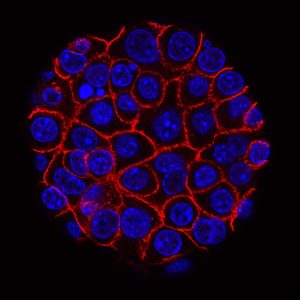
Two CHMP recommendations for AstraZeneca: Imfinzi in first-line lung cancer, Calquence in chronic lymphocytic leukaemia
pharmafile | July 27, 2020 | News story | Sales and Marketing | AstraZeneca, CHMP, Calquence, EMA, Imfinzi
AstraZeneca has secured two new recommendations for approval of its products from the European Medicines Agency’s Committee for Medicinal Products for Human Use (CHMP): Imfinzi (durvalumab) and Calquence (acalabrutinib).
Imfinzi received CHMP backing for the first-line treatment of extensive-stage small cell lung cancer (ES-SCLC) in combination with chemotherapy: etoposide plus either carboplatin or cisplatin.
This was off the back of Phase 3 study results showing that the company’s Imfinzi+chemotherapy combo lowered the risk of death by 27% compared to chemotherapy alone, as well as produced an overall response rate of 68% – a 10% improvement over chemo alone. These benefits were also shown in an updated analysis to endure for more than two years.
Dr Luis Paz-Ares, Chair of the Medical Oncology Department at Madrid’s Hospital Universitario Doce de Octubre and principal investigator in the study said the data, “shows that Imfinzi plus a choice of platinum-etoposide chemotherapies offers an important new 1st-line treatment option for extensive-stage small cell lung cancer, providing a sustained survival benefit with a well-tolerated treatment. For many physicians in Europe, cisplatin is a preferred chemotherapy in this setting, and this recommendation is a vital step toward bringing an immunotherapy combination with cisplatin to these patients in Europe for the first time.”
Meanwhile, Calquence also secured a nod for the treatment of chronic lymphocytic leukaemia (CLL), the most common form of leukaemia in adult patients, based on data from two Phase 3 studies in patients with previously untreated CLL, and in patients with relapsed or refractory CLL.
In previously untreated CLL patients, Calquence improved progression-free survival by 90% when used in combination with obinutuzumab, and by 80% when used as a monotherapy, compared to the chemo-immunotherapy treatment chlorambucil plus obinutuzumab.
In relapsed or refractory CLL patients, 88% receiving Calquence survived without disease progression for at least 12 months, compared to 68% of patients receiving rituximab combined with idelalisib or bendamustine.
“With its outstanding efficacy and tolerability profile, Calquence can offer important advantages to patients with CLL who are typically older, facing multiple comorbidities and often require treatment for many years,” explained José Baselga, Executive Vice President, Oncology R&D at AstraZeneca. “This positive recommendation brings us closer to providing a much-needed new treatment option to patients in Europe who are suffering from this chronic blood cancer.”
Matt Fellows
Related Content

AstraZeneca shares results for Imfinzi in phase 3 trial for small cell lung cancer
AstraZeneca has announced positive high-level results from the phase 3 ADRIATIC trial, which demonstrated that …

FDA accepts BLA for AstraZeneca and Daiichi Sankyo’s datopotamab deruxtecan for breast cancer treatment
AstraZeneca and Daiichi Sankyo have announced that their Biologics License Application (BLA) for datopotamab deruxtecan …

FDA approves AstraZeneca’s Ultomiris for NMOSD treatment
AstraZeneca has announced that the US Food and Drug Administration (FDA) has approved Ultomiris (ravulizumab-cwvs) …








